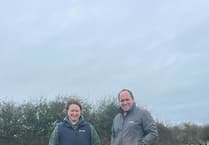HE MAY may only be two-feet tall, but Paul the Shetland pony’s value is in his therapeutic powers.
The miniature Shetland pony, named after the vet Paul Hallum who saved his life, is ideal as part of a therapy programme because he especially appeals to children because of his size. Hundreds of them have had their lives improved by meeting him.
It is now ten years since Chamaine and her mother Alyson Blamey set up the business and they are constantly busy with clients from specialist schools and referrals, including those with severe and complex needs.
The key is the empathy the ponies have – they can read emotions such as fear and joy and even levels of confidence. In a reverse sense, Paul’s back story also resonates with children especially.
Chamaine said: “Paul is our more recent star. He was born by caesarean section and his first-time mother sadly rejected him. One of our therapy ponies stood nearby, recognising his need and accepted Paul as her own which is incredibly unusual, even though she could not feed him herself. He was bottle fed by us.
“We work with many troubled children with big challenges to overcome some of their issues are down to their past trauma which is similar to Paul’s. Being fostered or adopted, they really relate to Paul. They say to us that ‘Paul’s like me’. That’s a big step in them feeling bonded with him and gaining confidence and self-belief in their abilities and potential. They see how he has thrived and they then gain self-belief that they can do the same.” Adults too benefit. said Alyson: “One lady came to us and kept her hands in her pockets, none of the ponies responded to her initially. Chamaine asked her how she felt about the ponies not responding. Once she opened up about her feeling the ponies sensed her need for support and she was suddenly surrounded by them and she burst into tears. She finally realised that she felt lonely but had been keeping people away and the ponies signified what can happen if she would only let people in. It was a moment of enlightenment for her and the ponies had helped her own up to that. We are facilitators, we are not counsellors.”
Mother and daughter are both fully qualified in Equine Behaviour & Therapy using ponies and other animals. They create obstacle courses which children work to complete with a pony, each item representing a life challenge, fear or doubt. The pony can sense a lack of confidence in the handler to overcome an obstale and hold back allowing the opportunity for conversation. People might then gain strength and even talk to the pony in way they would not to a human. Chamaine said there are so many occasions where people will interact or open up to our ponies where they will not talk to anyone else.




